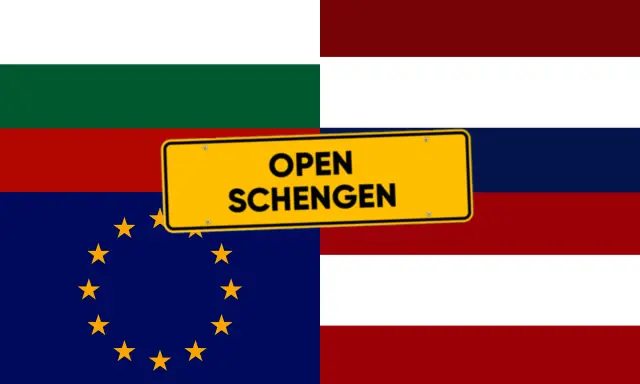
Bulgaria and Romania’s long-awaited entry into the Schengen border-free zone is edging closer to reality as Austria is expected to lift its veto.
However, lingering uncertainties surrounding the Netherlands’ position could pose challenges to the final decision.
Vienna’s anticipated decision to drop its opposition comes after years of disagreements and prolonged delays in the two countries’ bid to join the Schengen area.
A breakthrough is expected during a meeting of interior ministers from Austria, Romania, Bulgaria, and Hungary in Budapest on Friday.
Sources familiar with the talks revealed that Austria is prepared to relent, paving the way for a formal decision at the next EU interior ministers’ meeting on December 12.
If Austria withdraws its veto as expected, Bulgaria and Romania could see all border restrictions lifted by early 2025.
Romanian Prime Minister Marcel Ciolacu recently expressed optimism about the process, telling local media that a concrete timeline has been set. “This will happen from January 1, 2025,” Ciolacu said.
Despite this progress, attention now shifts to the Netherlands, where political developments could complicate the process. The Netherlands initially approved Bulgaria and Romania’s Schengen membership in 2023.
However, the inclusion of Geert Wilders’ far-right Freedom Party in the ruling coalition following the November elections has raised concerns about a potential shift in the Dutch stance.
According to the Financial Times, a new debate in the Dutch parliament will follow Austria’s expected withdrawal of its veto.
While many Dutch lawmakers are inclined to uphold their country’s prior decision, sources suggest there is a possibility of reassessment under the influence of the new political climate.
Observers close to the negotiations have underscored the importance of the Budapest meeting in signaling unity and encouraging the Netherlands to maintain its support.
A positive outcome from these discussions could bolster momentum ahead of December’s formal decision-making process.
Bulgaria and Romania have been pursuing full Schengen membership for over a decade.
While both countries currently apply parts of the Schengen acquis, full accession would eliminate checks at their borders with other Schengen states, enhancing trade and travel across Europe.
Critics of the prolonged delays have pointed out that both countries meet the technical requirements for membership.
Advocates argue that their inclusion would strengthen the Schengen area, particularly in light of ongoing challenges in managing migration and border security within the EU.
For Bulgaria and Romania, Austria’s expected policy shift represents a significant breakthrough after years of opposition rooted in concerns about migration and border management.
However, the looming uncertainty in the Netherlands highlights the fragile nature of consensus within the EU on this issue.
As the December 12 meeting approaches, all eyes will remain on Dutch lawmakers to see if they uphold their prior approval or succumb to internal political pressures.
For Bulgaria and Romania, their journey toward Schengen membership has reached a critical juncture, with the coming weeks likely to determine the outcome of over a decade of negotiations.
